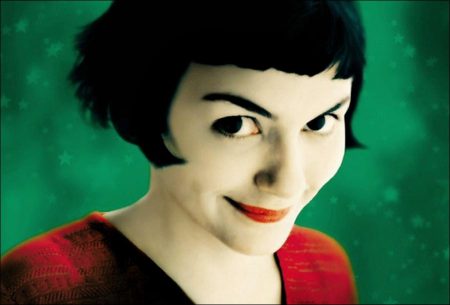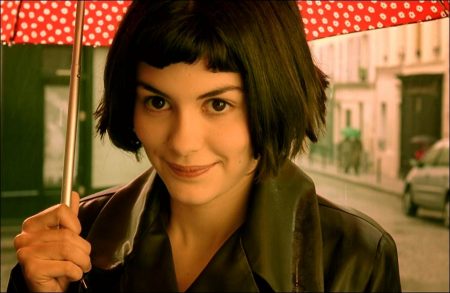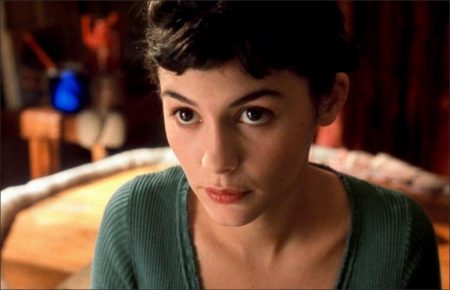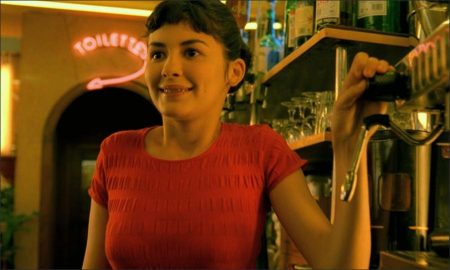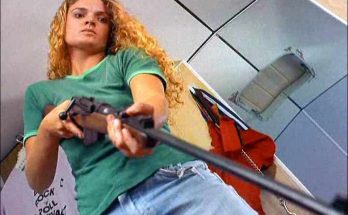Taglines: She’ll change your life.
Amélie is a story about a girl named Amélie whose childhood was suppressed by her Father’s mistaken concerns of a heart defect. With these concerns Amélie gets hardly any real life contact with other people. This leads Amélie to resort to her own fantastical world and dreams of love and beauty. She later on becomes a young woman and moves to the central part of Paris as a waitress. After finding a lost treasure belonging to the former occupant of her apartment, she decides to return it to him.
After seeing his reaction and his new found perspective – she decides to devote her life to the people around her. Such as, her father who is obsessed with his garden-gnome, a failed writer, a hypochondriac, a man who stalks his ex girlfriends, the “ghost”, a suppressed young soul, the love of her life and a man whose bones are as brittle as glass. But after consuming herself with these escapades – she finds out that she is disregarding her own life and damaging her quest for love. Amélie then discovers she must become more aggressive and take a hold of her life and capture the beauty of love she has always dreamed of.
Amélie (also known as Le fabuleux destin d’Amélie Poulain; French pronunciation: [lə.fa.by.lø.dɛs.tɛ̃.da.me.li.puˈlɛ̃]; English: The Fabulous Destiny of Amélie Poulain) is a 2001 French romantic comedy film directed by Jean-Pierre Jeunet. Written by Jeunet with Guillaume Laurant, the film is a whimsical depiction of contemporary Parisian life, set in Montmartre.
It tells the story of a shy waitress, played by Audrey Tautou, who decides to change the lives of those around her for the better, while struggling with her own isolation. The film was a co-production between companies in France and Germany. Taking in over $33 million in a limited theatrical release, it is to date the highest-grossing French-language film released in the United States, and one of the biggest international successes for a French movie.
The film received critical acclaim and was a major box office success. Amélie won Best Film at the European Film Awards; it also won four César Awards in 2002 (including Best Film and Best Director), two BAFTA Awards (including Best Original Screenplay), and was nominated for five Academy Awards.
The film was released in France, Belgium, and French-speaking western Switzerland in April 2001, with subsequent screenings at various film festivals followed by releases around the world. It received limited releases in North America, the United Kingdom, and Australasia later in 2001.
Cannes Film Festival selector Gilles Jacob described Amélie as “uninteresting”, and therefore it was not screened at the festival, although the version he viewed was an early cut without music. The absence of Amélie at the festival caused something of a controversy because of the warm welcome by the French media and audience in contrast with the reaction of the selector.
About the Story
Amélie Poulain (Audrey Tautou) is born in February 1974 and raised by eccentric parents who – incorrectly believing that she has a heart defect – decide to home school her. To cope with her loneliness, Amélie develops an active imagination and a mischievous personality. When Amélie is six, her mother, Amandine (Lorella Cravotta), is killed when a suicidal Canadian tourist jumps from the roof of Notre-Dame de Paris and lands on her.
As a result, her father Raphaël’s (Rufus) withdrawal from society worsens. Amélie leaves home at the age of 18 and becomes a waitress at the Café des 2 Moulins in Montmartre, which is staffed and frequented by a collection of eccentrics. Single but not a virgin, she finds contentment in simple pleasures like dipping her hand into grain sacks and cracking crème brûlée with a spoon, and lets her imagination roam free.
On 31 August 1997, startled by the news of the death of Princess Diana, Amélie drops a plastic perfume-stopper which dislodges a wall tile and accidentally reveals an old metal box of childhood memorabilia hidden by a boy who lived in her apartment decades earlier. Amélie resolves to track down the boy and return the box to him. She promises herself that if it makes him happy, she will devote her life to bringing happiness to others.
After inquiring the apartment’s concierge and several old tenants about the boy’s identity, Amélie meets her reclusive neighbour, Raymond Dufayel (Serge Merlin), an artist with brittle bone disease who repaints Luncheon of the Boating Party by Pierre-Auguste Renoir every year. He correctly recalls the boy’s name as “Bretodeau”. Amélie quickly finds the man, Dominique Bretodeau (Maurice Bénichou), and surreptitiously gives him the box. Moved to tears by the discovery and the memories it holds, Bretodeau resolves to reconcile with his estranged daughter and the grandson he has never met. Amélie happily embarks on her new mission.
Amélie secretly executes complex schemes that affect the lives of those around her. She escorts a blind man to the Métro station, giving him a rich description of the street scenes he passes. She persuades her father to follow his dream of touring the world by stealing his garden gnome and having a flight attendant friend airmail pictures of it posing with landmarks from all over the world. She starts a romance between her hypochondriacal co-worker Georgette (Isabelle Nanty) and Joseph (Dominique Pinon), one of the customers in the bar.
Amélie (2001)
Directed by: Jean Pierre Jeunet
Starring: Audrey Tautou, Matthieu Kassovitz, Rufus, Lorella Cravotta, Claire Maurier, Dominique Pinon, Isabelle Nanty, Yolande Moreau, Michel Robin
Screenplay by: Jean-Pierre Jeunet, Guillaume Laurant
Production Design by: Aline Bonetto
Film Editing by: Bruno Delbonnel
Film Editing by: Hervé Schneid
Costume Design by: Madeline Fontaine
Set Decoration by: Marie-Laure Valla
Art Direction by: Volker Schäfer
Music by: Yann Tiersen
MPAA Rating: R for sexual conten.
Distributed by: Miramax Films
Release Date: April 25, 2001 (France), August 16, 2001 (Germany)
Views: 204
